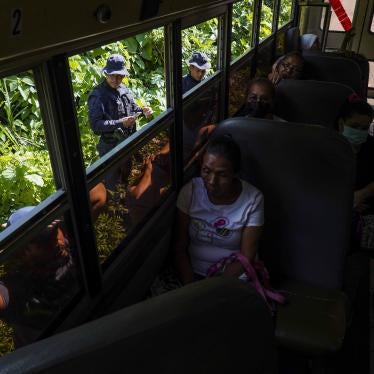When the corpse of Abdul Basir was found in an Afghan detention facility in December 2009, the Afghan National Directorate of Security (NDS), which had been holding Basir for the previous month, claimed he committed suicide by throwing himself out a window. Unexplained were the small, dark circles on his forehead, blackened cuts on his body, bruising in several places and a large cut to his chin. Unexplained, that is, if you don't know anything about detention practices in Afghanistan.
Torture in Afghan detention facilities, particularly by the NDS, is both widespread and widely known. In 2002, Human Rights Watch began issuing reports describing torture and other abuse by Afghan detention authorities. We directly relayed our concerns to the international forces in Afghanistan and their governments. In mid-2006, a Human Rights Watch representative met with an official at the Afghanistan Desk of the Department of Foreign Affairs and International Trade in Ottawa and specifically raised concerns about torture in Afghan detention facilities. In November 2006, we sent a public letter to NATO's secretary general expressing concern.
This week, I will appear before the House of Commons' special committee on the Canadian mission in Afghanistan on behalf of Human Rights Watch. I will tell the committee about Abdul Basir's case, and how his family reported that NDS officials warned them against seeking an autopsy, especially if they wanted Basir's father and brother, also in NDS detention, to be released.
Basir was detained by the NDS's Department 17 - a unit that receives persons captured and transferred by Canadian forces.
Other detainees held by the NDS have reported being beaten and subjected to electric shocks for days, and being deprived of food and water. One man had his thumbprint placed on a false confession after he had been beaten unconscious. Several detainees reported being hidden from international monitors conducting visits at the detention facilities.
Human Rights Watch is only one of several sources of information about torture and ill-treatment in NDS custody. The British government is currently engaged in a judicial review of its practice of transferring prisoners in Afghanistan to the NDS. The British have disclosed at least 11 separate instances, most of them in 2009, in which detainees handed over by their forces were allegedly beaten, forced into stress positions and subjected to electric shocks and sleep deprivation. One allegation relates to the NDS in Kandahar, the region where most Canadian transfers have occurred.
Canada has accepted so-called diplomatic assurances from the Afghan government that detainees will not be tortured, and believes it can monitor the conditions of the persons it transfers to Afghan custody. Such assurances are generally ineffective, and monitoring only allows an opportunity to find out about torture after it happens. If the case of Maher Arar - the Canadian transferred to Syria via the United States and held for a year - made anything clear, it is that the effects of torture cannot be undone.
Canada has a clear obligation under international law not to transfer people to the custody of another state where there are substantial grounds for believing they will be tortured. Afghanistan's NDS and other detaining authorities have a known record of torturing security detainees. For this reason, Human Rights Watch calls on Canada to immediately suspend all detainee transfers to Afghan custody.
The Canadian government should immediately explore alternative detention arrangements with other governments and with Afghanistan. It should also take rapid steps toward establishing sustainable, long-term detention options that are consistent with Canada's international legal obligations. This will entail training local authorities and strengthening local detention capacity so that Afghanistan can meet its own international legal obligations for the humane treatment of prisoners.
Canada should also redouble its efforts to help reform Afghan justice institutions. A significant motivation for torture by NDS and other Afghan authorities is the belief that criminal convictions can only be secured through confessions. Improving investigation skills and capacity among Afghan investigators and prosecutors - and fostering the political will to use them - can change this mindset. Here again, there is an opportunity for Canada to actively engage with Afghans and other nations working on the rule of law to build the Afghan government's capacity for detention and trials that comply with international standards.
Canada should be at the forefront of ending torture in Afghanistan, not complicit in it.






